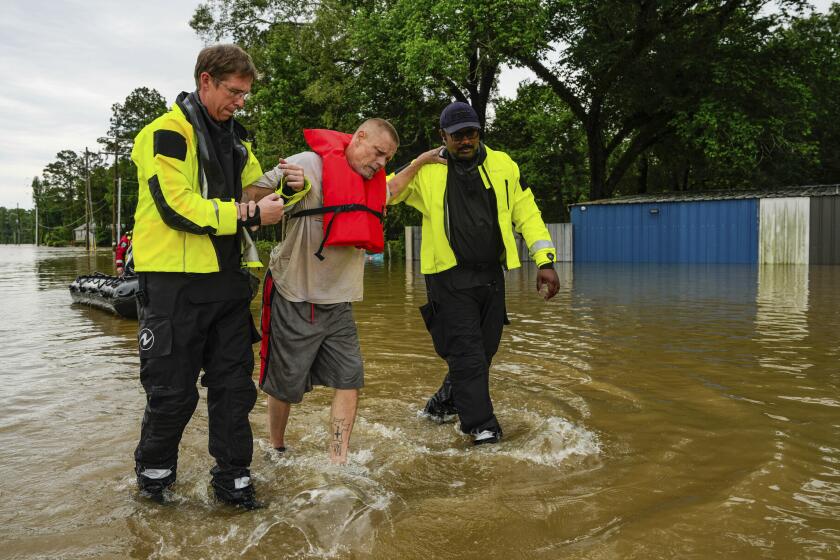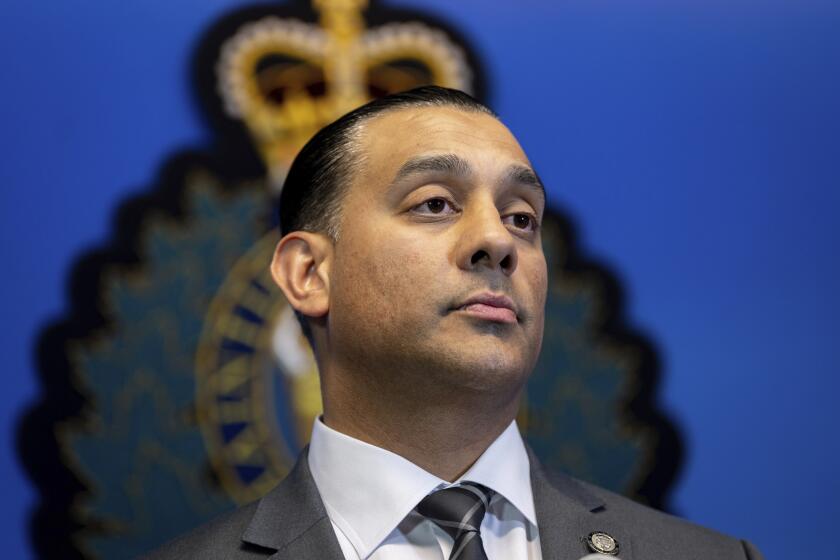Bush Planning to Boost Aid to Afghanistan by $1 Billion
President Bush is planning soon to announce a doubling of this year’s aid to Afghanistan in an effort to make visible improvements in the lives of the Afghan people before the country’s first elections, scheduled for June.
Some diplomats and aid workers say the anticipated $1-billion boost in aid is long overdue to speed up reconstruction and combat the Taliban insurgency that is gaining ground in southern Afghanistan.
Guerrillas have been clashing with U.S. and Afghan forces by day and leaving letters in villages by night threatening death to those who collaborate with Americans. Two police chiefs and three mullahs who supported the U.S.-backed central government of President Hamid Karzai have been assassinated in the last six weeks.
“It is in our interests, in the Afghans’ interests, in the security interests of the region that a moderate government emerge from that election,” a senior Bush administration official said. If the moderates are to prevail, he said, Karzai and members of his government need “to show their people that they delivered security, economic benefits, reconstruction, political advancement.... That it’s built schools, clinics and roads.”
U.S. officials acknowledge that aid efforts in Afghanistan leveled off while the United States was preoccupied with the war in Iraq. But they reiterated that the United States will not repeat the mistake it made by abandoning Afghanistan to chaos after the Soviet Union ended its occupation in 1989.
The United States spent $900 million in Afghanistan in 2002 and expected to do the same this year. The new initiative means that this year’s spending would be boosted to about $1.9 billion. The administration also will seek matching contributions from other nations at a Sept. 21 donors conference in Dubai, in the United Arab Emirates, officials said.
“We never again want Afghanistan to be the home of terrorists,” said William Taylor, the State Department’s coordinator for Afghanistan.
Details of the new package -- including where the money will come from -- are still being hammered out, said the administration officials, who spoke on the condition of anonymity. At least a third of the aid will be used to accelerate recruitment and training for the Afghan National Army and national police force, to improve security. The Afghan army had been losing up to 40% of its recruits, but improvements in salaries and living conditions have boosted retention to about 85%, an official said.
The aid will be focused on areas where reconstruction has been slow -- including the Pushtun areas of the south and southeast, where the Taliban is active, another official said.
Bush specifically wants a shattered 300-mile road the U.S. is rebuilding between Kabul and Kandahar -- a project of great economic and symbolic importance -- to be completed as promised by December, a senior State Department official said.
With help from Britain, New Zealand and possibly Germany, the U.S. also plans to double the number of U.S.-Afghan joint “provincial reconstruction teams” that patrol far-flung Afghan provinces, rebuilding schools, wells, bridges and communications and keeping an eye on local warlords. The present four teams will be increased to eight by fall, and Taylor said he was pushing for more.
“Their presence has an amazing effect on perceptions of security,” Taylor said. “Confidence goes up that the local warlord will not be able to have the run of the place as they have in the past.”
U.S. planners are trying to ensure that money pumped quickly into the undeveloped country is used to help the poorest Afghans, not the best-connected, he said.
In a commitment to the “nation-building” that the administration once shunned, eight to 12 senior political advisors will be sent to each Afghan minister, and a cadre of technocrats will be dispatched to help Afghanistan’s largely untrained bureaucracy administer the aid.
The technocrat program is politically delicate, because the Soviet Union filled Afghanistan’s ministries with technical advisors during its occupation -- and still failed to run the country effectively.
International expertise is clearly needed to create a modern Afghanistan, but “the question is whether from a cultural and psychological perspective you can make this work,” said Alexander Thier, an Asia Foundation official working in Kabul, the capital. “People see foreign advisors as a portent of more sinister things.”
The only way to gain the confidence of the Afghan people -- and defuse support for the Taliban -- “is to get them jobs and give them a voice in governing their country,” Thier said.
The recent Taliban insurgency has heightened Washington’s sense of urgency about the pace of reconstruction in Afghanistan.
The Taliban revival in Afghanistan is “very serious,” Barnett Rubin, an Afghanistan expert who is director of New York University’s Center on International Cooperation, said in an interview from Kabul. Although the resurgence is not a threat to either the central or local Afghan governments, Rubin said, it makes large areas of the country off-limits to aid workers, prevents the government from exercising its authority and reinforces a vicious cycle of excluding the ethnic Pushtuns who live in those areas from political and economic gains.
Rubin cited reports that Taliban and Al Qaeda terrorist forces are openly organizing and operating out of bases in Pakistan, allegedly with help from Pakistani security services. Pakistan has denied this. But Sen. John McCain (R-Ariz.) said after a visit to the region last month that Pakistan was not doing all it could to stop cross-border attacks.
Taylor said Taliban fighters who used to infiltrate Afghanistan from Pakistan in groups of one to three are now moving across the border in large formations.
More to Read
Start your day right
Sign up for Essential California for news, features and recommendations from the L.A. Times and beyond in your inbox six days a week.
You may occasionally receive promotional content from the Los Angeles Times.






